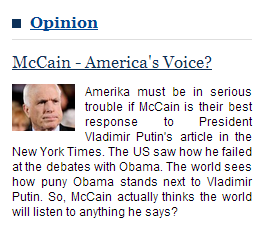The comments of:
14:58 21 сентября,
17:41 21 сентября,
and 17:19 21 сентября
were deleted by "Pravda" without any explanations.
Interesting.
I do not have any further comments at this point, except, maybe just to repeat that old adage: actions speak louder than words.
"Будем надеяться": Let us hope that the "dialogue" will continue but in a proper and civilised fashion and that no one will try to take the others for the easy dupes (I think that we certainly do not do it).
9.21.13 - Update:
This post was eventually published as a comment on the page hyperlinked below and evoked some very interesting responses from some anonymous (although I do have some idea who it is) mad Facebook pussycats and Twitter accounts without names and faces (both opened for this specific purpose, on 9.21.13), which, I think, reflects the depth of social psychopathology among "Pravda" commentators paid by the KGB or recently rehired (maybe, also for the same specific purpose and as a reward for the past "achievements") by some "higher-up" sources. Please, read these responses (most likely, they are from the one and the same "person"); it is quite enlightening.
Mr. Editor:
In the article:
"Американцы считают, что Маккейн в статье говорит о США, а не о России" (http://www.pravda.ru/news/world/20-09-2013/1175018-mccain-0/, in translation, "The Americans think that McCain in his article talks about the USA, not Russia" - I could not find this page in English on your site, strangely enough; was it intended mostly for your gullible Russian readers?)
there are names of some people, who as you claim, send their comments or responses to your paper.
Who are these people? How do we know that these responses are genuine?
Why there are no connections to their Facebook or Twitter pages?
I would not be surprised if these responses are manufactured by you with the purpose to confuse readers and that they are nothing more than falsifications.
For example, the name of "Nava Nova", which appears on the top of this list should not be confused with my blogging or pen name: Mike Nova, which appears in my blogs: RUSSIA and THE WEST (http://east-and-west-org.blogspot.com/), Mike Nova (http://mn-3.blogspot.com/) and others. My real name is Michael Novakhov, and I never hid or concealed neither of these names in my writings and comments, including the comments in "Russian Journal" starting from several years ago; I did not and do not have any reasons to do that. I suspect that this name "Nava Nova" was placed there specifically to create a confusion with my blogging name. If the responses that you publicised are real and from the real people, please present the proofs of it and present the connections with their other pages on the Internet, just like most other publications do, including the same "Russian Journal" and establish this as a matter of your general policy. If you are not able or willing to do this, then it can be assumed that these responses are fictitious, and it will also confirm, that contrary to the name of your paper, "Pravda" or "The Truth", there is no a grain of truth in whatever you publish and you are the same liars and manipulators, as you were in Soviet times.
By the way, "America" is spelled exactly as it is, with the "c", not "Amerika", as it appears on your front page. Learn first the correct spelling and learn first what America is, before publishing your lies and nonsense. Even in this incorrect spelling you manage to exude your poison or just showing your ignorance, or trying to "rusify" the name and your understanding, or rather, misunderstanding of our country. This will not happen: you are not and will not be able to "rusify" America; this misspelling might just betray your own conscious or unconscious dream or desire: to "americanise" Russia, from which she will greatly benefit.
Absolutely sincerely and directly, Michael Novakhov
I tried to send this letter to "Pravda" several times, but their email connection simply does not work, generating the "error" response: "Ошибка при отправке сообщения".
Nothing works in Russia, except for her criminal state and for her criminal enterprises; the whole Russia is one huge "error response", very unfortunately for her perpetually suffering people; just like there had never been and there is no now any "truth" in "Pravda".
в 14:58 21 сентября
уебан во всем своем безвкуссии, собственно лицо тому подтверждение... Интересно дети такие же дебилоиды или все таки от соседа??? будем надеятся его жена была предусмотрительна в плане зачатия и уберегла род от копирайта этого задолбыша
|
- в 17:41 21 сентября"будем надеятся" should be written "будем надеяться". Learn to speak and write the great Russian language, уёбок (as in "закрой свой рот ебучий уёбок сын ты сучий")! Будем надеяться that Haldol will help you with your mad logorrhea, this is your last hope, pussycat.Ответить
- в 17:19 21 сентябряTake your Haldol, pussycat; put it in your tap water.Ответить
в 12:10 21 сентября
Die out of your poison!! All the world knows ameriKans are zombies and stupid robots. The US of AmeriKa is a state of devil ,false and shit! Wait a little,you will be destroyed soon!!!
Russia was ,is and will be always.
Spit onto you.
|
- в 17:21 21 сентябряTwitter account without a face, commentator without brains: very symbolic of modern Russian "socium (социум)".
First Posted on 9/20/2013 05:56:00 PM Last Update on 9.21.13

